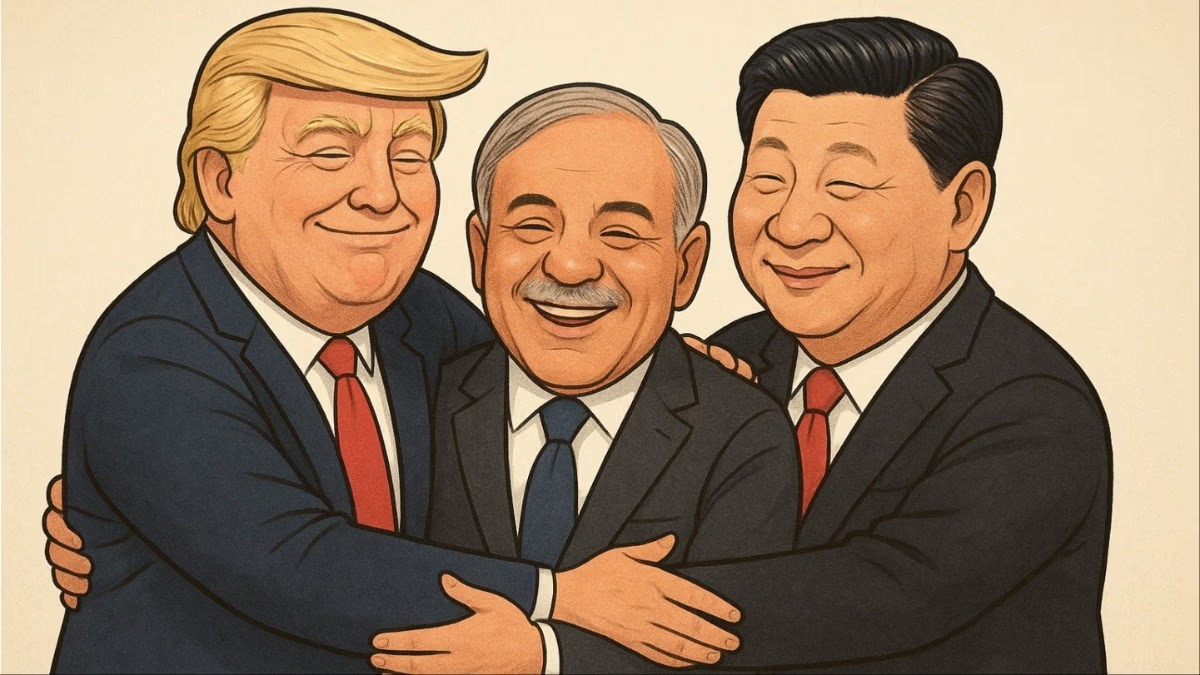Pakistan, once lauded as China's 'Iron Friend,' now seems to be openly courting the United States. This is evident in several significant instances. From Pakistan's army chief, General Asim Munir, having lunch at the White House with U.S. President Donald Trump, to extending an invitation for him to visit Pakistan, to offering American companies access to crypto, oil, and mineral resources in Balochistan. Furthermore, Prime Minister Shehbaz Sharif and Munir praised Trump's role in the India-Pakistan ceasefire, even nominating him for a Nobel Peace Prize—these are all major indicators of change.
Nonetheless, Pakistan hasn't shed its old habits and continues to play a double game with both powers, the U.S. and China.
Analysts suggest that this balancing act could make Pakistan a battleground in the evolving global order of the 21st century.
Despite this, Pakistan is neither hiding its strategy to engage both China and the U.S. In fact, PM Shehbaz Sharif recently stated that the second phase of the China-Pakistan Economic Corridor (CPEC 2) represents Pakistan's last ditch effort to garner economic aid from China.
Yet, China now views Pakistan as a country reliant on its funds. The real question remains—how long will China tolerate Sharif and Munir's growing proximity with President Trump?
While the U.S. might overlook Pakistan's decades-old ties with China, for China, this 'duplicity' is exceedingly perilous. China remains Pakistan's biggest investor and arms supplier.
Antara Ghoshal Singh, a fellow at the Observer Research Foundation (ORF), wrote in an article in July that Chinese analysts feel that though Pakistani soldiers defended their skies with Chinese fighter planes, the eventual credit went to the U.S., making the situation awkward for China.
Retired Major General Mandeep Singh of the New Delhi-based IDSA comments, 'Pakistan is stuck between two quandaries. The U.S. aims to re-enter Afghanistan, potentially using Pakistan. Conversely, China will not tolerate any U.S. re-entry into Afghanistan at any cost.'
After the U.S. left Bagram Airbase in 2021, China's focus shifted to the mineral wealth there, even planning to involve Afghanistan in the CPEC. If Trump regains control of Bagram, it might lead to a direct confrontation between China and the U.S., entangling Pakistan between two world powers.
In June, General Asim Munir dined with Trump at the White House following the India-Pakistan ceasefire. This marked his second high-level U.S. visit in mere months. Shortly after, Pakistan nominated Trump for a Nobel Peace Prize, arguing he had averted a 'mini-war' between India and Pakistan.
On the economic front, Pakistan has opened Balochistan's rare earth minerals, copper, lithium, oil, and blockchain investment opportunities to the U.S. This was presented as a partnership with World Liberty Financial, associated with Trump's family, to help Pakistan emerge as a crypto hub.
Recent initiatives by Pakistan, including a potential Trump-Shehbaz meeting at the UN General Assembly, indicate that Pakistan, which has become isolated internationally, is adopting diplomacy to charm others and alter its standing.
However, this approach runs counter to China's interests, which views Pakistan as its 'Iron Brother' and has invested $62 billion in the CPEC. Pakistan's closeness to the U.S. could undermine the CPEC.
Additionally, when Pakistan credited its recent achievements to the U.S., Chinese analysts criticized it. Prime Minister Shehbaz Sharif recently declared that CPEC 2, focusing on agriculture, special economic zones (SEZs), and mineral resources, represents Pakistan's last hope for Chinese assistance.
This statement reflects Pakistan's anxiety and compulsion, but it may irk China, which sees Pakistan as a partner for gaining access to the Arabian Sea through the Belt and Road Initiative (BRI). Moreover, the Afghanistan issue exacerbates this tension.
Following the U.S. withdrawal from Afghanistan in 2021, China eyed the mineral resources there. Chinese President Xi Jinping has both planned to expand the CPEC into Afghanistan and made connectivity and counter-terrorism agreements with the Afghan Taliban.
Defense expert, Retired Major General Mandeep Singh cautions, 'Donald Trump's renewed plan to control Bagram Airbase spells alarm for China. It's perilously close to China's nuclear sites, and American presence there could directly challenge China's regional supremacy ambitions. This tug-of-war over Bagram could fuel a major conflict.'
It's undeniable that the mounting tension between the U.S. and China won't immediately result in a major conflict. Some Western and Pakistani experts believe both nations harbor different aspirations from Pakistan.
Former Pakistani Ambassador Maleeha Lodhi told German broadcaster DW, 'Pakistan's relationships with the U.S. and China are entirely distinct. While the U.S. fulfills some of Pakistan's interests, China is crucial for Pakistan's future.'
American South Asian geopolitical expert Michael Kugelman asserts, 'The Trump administration has simplified Pakistan's task. It's surprising how eager Trump's team is to deepen ties with Pakistan and explore business—distinct from China's ties with Pakistan. This balance is key. The real advantage lies in the varied expectations the U.S. and China have from Pakistan.'
However, in the long run, Pakistan's maneuver could spell trouble. The U.S. eyes Balochistan's rare earth minerals, albeit not abundant, while China wants energy security, infrastructure, and business from Pakistan via the CPEC.
The infrastructure developed by China in Balochistan and even Chinese citizens and Pakistani officials have been repeatedly targeted by the Baloch Liberation Army (BLA) and other separatist organizations.
According to ORF fellow Antara Ghoshal Singh, many Chinese analysts believe that Pakistan's newfound warmth towards Trump-led America poses several risks for China. Some experts even suggest that Pakistan could become a battleground for these two superpowers, potentially leading to conflict.
China's primary concern is that the U.S. might infiltrate the $62 billion CPEC, especially the Gwadar Port, which China considers the lifeline of the CPEC.
Some Chinese analysts suspect that in secret talks with Pakistani Army Chief Asim Munir, Trump requested sensitive Chinese military intelligence documents related to the minor clash between India and Pakistan in May.
There’s also concern that the U.S. is attempting to distance Pakistan from Iran, potentially derailing China's Middle East policy.
Moreover, the Pakistan-U.S. cryptocurrency partnership is problematic for China, as it could undermine the role of RMB (China's currency, Yuan) in settlements. Should this occur, China's real economic investment in Pakistan could diminish.
Chinese analysts perceive Pakistan's actions as a 'stab in the back' and fear it could unsettle the deep strategic trust between the two nations.
Pakistan holds talks with Trump for exclusive Balochistan investment opportunities.
China's analysts express concern over Pakistan's U.S. alignment.
Geopolitical analyst SL Kanthan remarks, 'Pakistan will persist with its balancing act, continuing to secure concessions from both America and China, until the day they must choose when pushed to the brink of conflict.'
He shared on the social media site X, 'Pakistan is preparing to break away from China's sphere of influence. Yet until the decisive moment, until America and China teeter on the brink of war, Pakistan continues to benefit from both sides and barter from the middle.'
Meanwhile, former Pakistani military officer and now journalist Adil Raja warns, 'To think China would allow the U.S. to play games freely in its backyard, i.e., Pakistan, is naive.'
This double game—courting both the U.S. and China—might ultimately turn into an explosive conflict, one that would not be advantageous for Pakistan at all.




